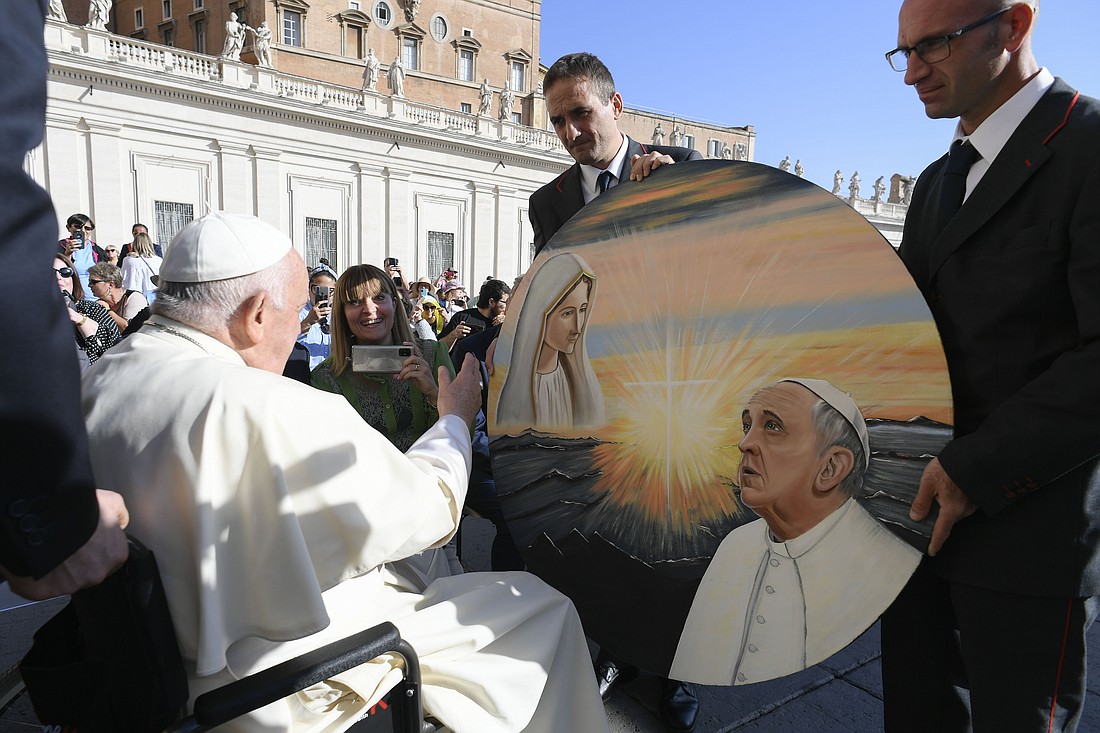Love, forgiveness liberate, break cycles of violence, Pope says
October 11, 2023 at 11:26 a.m.

VATICAN CITY CNS - "Often a wounded person wounds in turn; the oppressed easily becomes an oppressor," the Pope said Oct. 11 at his weekly general audience in St. Peter's Square.
In contrast, he said, St. Bakhita teaches people that "forgiveness takes away nothing but adds dignity to the person; it makes us lift our gaze from ourselves toward others, to see them as fragile as we are, yet always brothers and sisters in the Lord."
Continuing a series of audience talks highlighting saints who demonstrate zeal or passion for evangelization, Pope Francis said St. Bakhita's life story shows how "forgiveness is the wellspring of a zeal that becomes mercy and calls us to a humble and joyful holiness."
The Pope also used the occasion to pray for peace in Sudan, where a power struggle unleashed violence in April and fighting continues although, as he noted, very little is said about it in the news.
St. Bakhita, who lived 1869-1947, was abducted and enslaved at the age of 7. "She suffered cruelty and violence: on her body she bore more than a hundred scars," the Pope said.
And yet, she wrote, "I never despaired, because I felt a mysterious force supporting me."
Later she was given a crucifix –the first thing she ever owned –and, the Pope said, "looking at it, she experienced a profound inner liberation, because she felt understood and loved and therefore capable of understanding and loving in turn. This is how it begins. One feels understood, loved and is then able to understand and love others."
Having compassion, he said, "means suffering with the victims of the many forms of inhumanity present in the world as well as pitying those who commit errors and injustices –not justifying them, but humanizing them."
"When we enter into the logic of conflict, division among us, bad feelings, one against another, we lose humanity," the Pope said. But St. Bakhita teaches that the solution is "to humanize, humanize ourselves and humanize others," by forgiving them and giving them another chance.
"Forgiveness liberated her," the Pope said. "Forgiveness first received through God's merciful love, and then the forgiveness given that made her a free, joyful woman, capable of loving."
Related Stories
Monday, December 15, 2025
E-Editions
Events
VATICAN CITY CNS - "Often a wounded person wounds in turn; the oppressed easily becomes an oppressor," the Pope said Oct. 11 at his weekly general audience in St. Peter's Square.
In contrast, he said, St. Bakhita teaches people that "forgiveness takes away nothing but adds dignity to the person; it makes us lift our gaze from ourselves toward others, to see them as fragile as we are, yet always brothers and sisters in the Lord."
Continuing a series of audience talks highlighting saints who demonstrate zeal or passion for evangelization, Pope Francis said St. Bakhita's life story shows how "forgiveness is the wellspring of a zeal that becomes mercy and calls us to a humble and joyful holiness."
The Pope also used the occasion to pray for peace in Sudan, where a power struggle unleashed violence in April and fighting continues although, as he noted, very little is said about it in the news.
St. Bakhita, who lived 1869-1947, was abducted and enslaved at the age of 7. "She suffered cruelty and violence: on her body she bore more than a hundred scars," the Pope said.
And yet, she wrote, "I never despaired, because I felt a mysterious force supporting me."
Later she was given a crucifix –the first thing she ever owned –and, the Pope said, "looking at it, she experienced a profound inner liberation, because she felt understood and loved and therefore capable of understanding and loving in turn. This is how it begins. One feels understood, loved and is then able to understand and love others."
Having compassion, he said, "means suffering with the victims of the many forms of inhumanity present in the world as well as pitying those who commit errors and injustices –not justifying them, but humanizing them."
"When we enter into the logic of conflict, division among us, bad feelings, one against another, we lose humanity," the Pope said. But St. Bakhita teaches that the solution is "to humanize, humanize ourselves and humanize others," by forgiving them and giving them another chance.
"Forgiveness liberated her," the Pope said. "Forgiveness first received through God's merciful love, and then the forgiveness given that made her a free, joyful woman, capable of loving."










